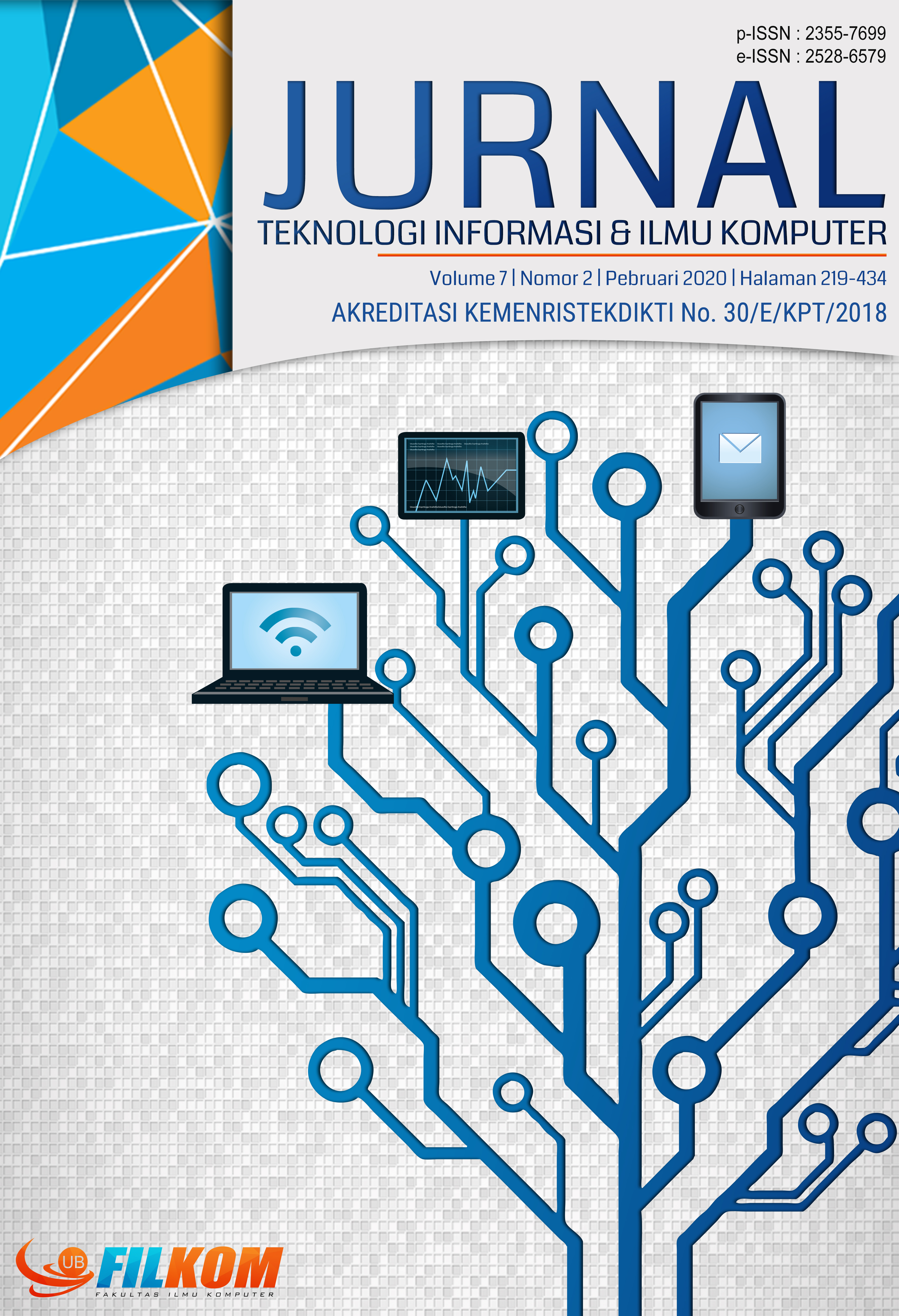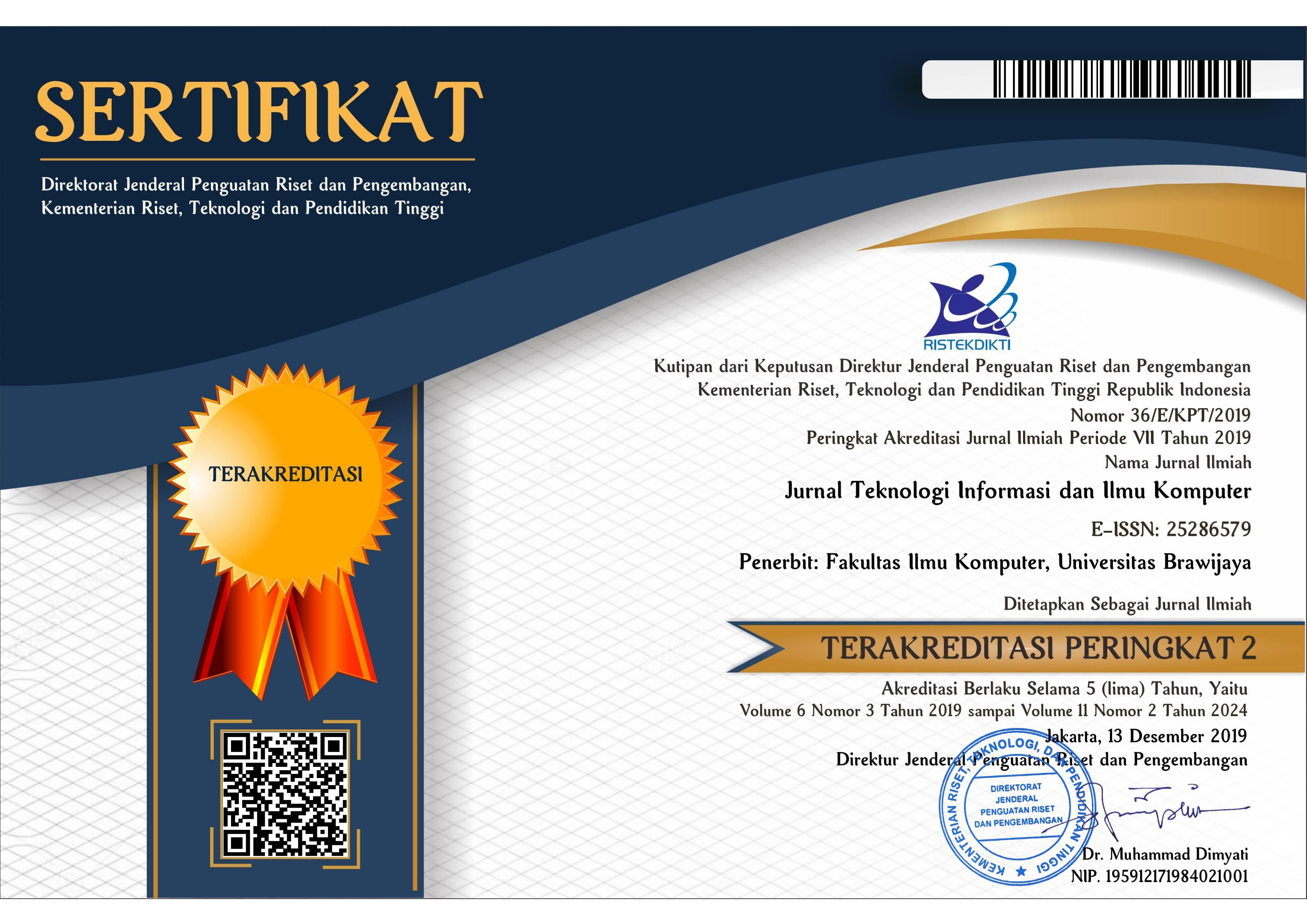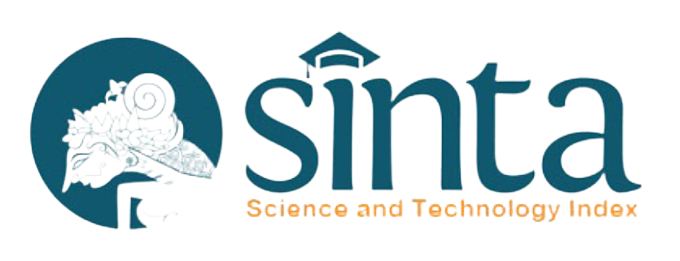Penerapan Agent-Based Simulation dalam Memprediksi Penggunaan Berkelanjutan Sistem ERP
DOI:
https://doi.org/10.25126/jtiik.2020721817Abstrak
Kegagalan perusahaan dalam memperoleh manfaat dari penerapan sistem ERP umumnya disebabkan karena banyak perusahaan merasa cukup puas dengan keberhasilan pemasangan sistem ERP dan cenderung tidak menaruh perhatian besar terkait hal-hal yang terjadi setelahnya. Padahal, kesulitan terbesar dalam implementasi ERP adalah bagaimana sistem ERP digunakan secara berkelanjutan oleh pengguna. Pengguna sistem ERP tentunya memiliki karakteristik yang berbeda satu dengan lainnya. Oleh karena itu, perusahaan yang melakukan implementasi sistem ERP perlu melakukan identifikasi mengenai hal-hal yang dapat meningkatkan penggunaan berkelanjutan sistem ERP oleh penggunanya. Oleh karena itu, penelitian ini bertujuan untuk melakukan prediksi terkait penggunaan berkelanjutan yang akan dilakukan oleh pengguna sistem ERP. Metode yang digunakan pada penelitian ini adalah agent-based simulation. Pendekatan agent-based simulation dirasa cocok untuk mengidentifikasi perilaku penggunaan berkelanjutan yang dilakukan pengguna karena memungkinkan dilakukannya pengamatan terkait dengan perilaku agent yang memiliki beragam karakteristik. Pada penelitian ini beberapa skenario simulasi terkait dengan motivasi intrinsic (IM) dan daya serap dalam menerapkan (ACP) yang merupakan karakteristik individu pengguna sistem ERP dibangkitkan. Hasil dari penelitian ini menunjukkan penggunaan berkelanjutan sistem ERP dalam suatu perusahaan dipengaruhi oleh karakteristik yang dimiliki oleh pengguna sistem. Apabila mayoritas pengguna sistem ERP memiliki IM dan ACP yang tinggi maka sistem ERP diprediksi tidak akan mengalami discontinuitas. Apabila mayoritas pengguna sistem memiliki IM dan ACP yang rendah, maka manajer perlu mengambil tindakan-tindakan untuk meningkatkan IM dan ACP pengguna.
Abstract
The failure of organization in realizing the benefit from ERP system implementation is caused by most organization thought that success installation of ERP system is enough and they don’t put into concern things happened in post-implementation stage. Even though, the greatest challenge in ERP implementation is on how to ensure that ERP system users use ERP continuously. It is obvious that ERP system user possess individual characteristic that might be differ one another and will affect their decision to continue use ERP system or not. Therefore, it is necessary to identify on aspect that can drive ERP system continuance usage by its user. Agent-based simulation approach is considered appropriate in identifying continuance usage performed by the user. It is because agent-based simulation approach allows observation related various behavior of an agent. Thus, this study aimed to predict continuance usage performed by the ERP users using agent-based simulation approach based on user’s individual characteristics. Several scenarios related to user’s intrinsic motivation and absorptive capacity for applying generated in this study. The result of this study found that continuance usage of ERP system in organization is influenced by user’s individual characteristics. When the majority of ERP system users have high IM and ACP then discontinuity of ERP system most likely will not happen. On the other side, special treatment must be performed when the majority of the ERP users have low IM and ACP. Further action that can be taken by manager with low IM and ACP on ERP users was discussed in this paper.
Downloads
Referensi
BAHESTI, H. M., & BAHESTI, C. M., 2010. Improving productivity and firm performance with enterprise resource planning. Enterprise Information Systems, 4(4), 445-472.
BHATTACHERJEE, A., 2001. Understanding Information Systems Continuance: An Expectation-Confirmation Model. MIS Quarterly, 25(3), p.351-370.
CHOU, H.-W., CHANG, H.-H., LIN, Y.-H., & Chou, S.-B. (2014). Drivers and effects of post implementation learning on ERP usage. Computers in Human Behavior, 35, 267-277.
CHOU, S.-W., & CHEN, P.-Y., 2009. The Influence of individual differences on continuance intentions of enterprise resource planning (ERP). International Journal of Human-Computer Studies, 67(6), 484-496.
CHOU, S.-W., HUNG, I.-H., & CHANG, Y.-C., 2013. Understanding the Antecedents of ERP Implementation Success: The Perspective of Knowledge Transfer. Asia Pasific Management Review, 18(3), p.301-322
DAVENPORT, T. H., 1998. Putting the enterprise into enterprise system. Harvard Business Review, 76(4), p.121-132.
HAIR, J.F., BLACK, W.C., BABIN, B.J., ANDERSON, R.E., 2009. Multivariate Data Analysis: A Global Perspective, 7th ed. Upper Saddle River: Prentice Hall.
HARREL, C., GHOSH, B.K., BOWDEN, J.R., 2004. Simulation Using Promodel. New York: Mc Graw Hill.
HOLSAPPLE, C.W., SENA, M.P., 2005. ERP plans and decision-support benefits. Decision Support Systems, 38(4), pp. 575-590.
HSU, P.-F., YEN, H. R., & CHUNG, J.-C., 2015. Assessing ERP post-implementation success at the individual level : Revisiting the role of service quality. Information & Management, 52(8), p.925-942.
LI, X., HSIEH, P-A., RAI, A., 2009. A Motivational Account for Post-Acceptance Routine and Innovative Use: Introducing the Concept of Tri-Dimensional Intrinsic Motivation. International Conference on Information Systems (ICIS).
MATENDE, S., & OGAO, P., 2013. Enterprise Resource Planning (ERP) System Implementation : A case for User Participation. Procedia Technology, 9, pp. 518-526.
McGINNIS, T. C., & HUANG, Z., 2007. Rethinking ERP success: A new perspective from knowledge management and continuous improvement. Journal of Information & Management, 44, p.626-634.
NWANKPA, J., & ROUMANI, Y., 2014. Understanding the link between organizational learning capability and ERP system usage: An empirical examination. Computers in Human Behavior, 33, p.224-234
PALANISAMY, R., 2008. Organizational Culture and Knowledge Management in ERP Implementation : an empirical study. Journal of Computer Information System, 48(2), p.100-120
PARK, J., SUH, H., YANG, H., 2007. Perceived absorptive capacity of individual users in performance of Enterprise Resource Planning (ERP) usage: The case for Korean firms, Information & Management, 44(3), p.300-312.
RAMADHAN, F., RIZANA, A. F., SOESANTO, R. P., KURNIAWATI, A., WIRATMADJA, I. I., 2018a. An application of agent-based modeling and simulation in tacit knowlege transfer effectiveness and individual performance through the consideraion of feedback mechanism. IEEE International Conference on Industrial Engineering and Engineering Management (IEEM).
RAMADHAN, F., RIZANA, A. F., RISPIANDA, YOANITA, Y., 2018b. Kesuksesan knowledge transfer di laboratorium perguruan tinggi melalui pengelompokkan rekan kerja menggunakan agent-based modeling and simulation. Jurnal Teknik Industri, 19(2) pp. 205-219.
RIZANA, A.F., KURNIAWATI, A., SOESANTO, R.P., RAMADHAN, F., 2018. The Role of Individual Characteristic in Encouraging User Performance and Continuance Usage Decision of Enterprise System. International Confrence on Instrumentation, Management, Automation, Control System, and Informatics 2018 (in press).
SHANG, S., & SEDDON, P. B., 2000. A Comprehensive Framework for Classifying the Benefits of ERP Systems. Americas Conference on Information Systems (AMCIS) 2000 Proceedings. 11, pp. 1005-1014. AIS Electronic Library (AISeL).
TORKZADEH, D., & DOLL, W. J., 1999. The development of a tool for measuring the perceived impact of information technology on work. International Journal of Management Science. Pergamon, 27, 327-339.
UTAMI, Y., NUGROHO, A., WIJAYA, A.F., 2018. Perencanaan Strategis Sistem Informasi dan Teknologi Informasi pada Dinas Perindustrian dan Tenaga Kerja Kota Salatiga, Jurnal Teknologi Informasi dan Ilmu Komputer, 5(3), p.253-260.
Unduhan
Diterbitkan
Terbitan
Bagian
Lisensi

Artikel ini berlisensi Creative Common Attribution-ShareAlike 4.0 International (CC BY-SA 4.0)
Penulis yang menerbitkan di jurnal ini menyetujui ketentuan berikut:
- Penulis menyimpan hak cipta dan memberikan jurnal hak penerbitan pertama naskah secara simultan dengan lisensi di bawah Creative Common Attribution-ShareAlike 4.0 International (CC BY-SA 4.0) yang mengizinkan orang lain untuk berbagi pekerjaan dengan sebuah pernyataan kepenulisan pekerjaan dan penerbitan awal di jurnal ini.
- Penulis bisa memasukkan ke dalam penyusunan kontraktual tambahan terpisah untuk distribusi non ekslusif versi kaya terbitan jurnal (contoh: mempostingnya ke repositori institusional atau menerbitkannya dalam sebuah buku), dengan pengakuan penerbitan awalnya di jurnal ini.
- Penulis diizinkan dan didorong untuk mem-posting karya mereka online (contoh: di repositori institusional atau di website mereka) sebelum dan selama proses penyerahan, karena dapat mengarahkan ke pertukaran produktif, seperti halnya sitiran yang lebih awal dan lebih hebat dari karya yang diterbitkan. (Lihat Efek Akses Terbuka).














